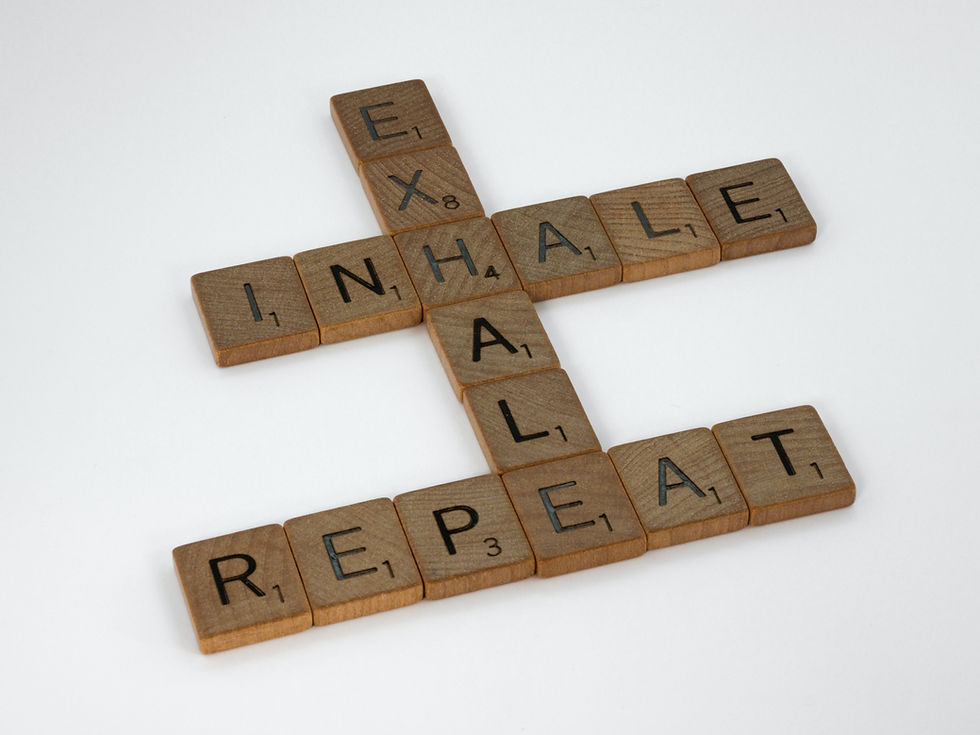What Your Body Wants You to Know About STRESS
- Marissa Sylvester
- Oct 27, 2021
- 4 min read
When I ask my clients about some of the stressors in their life, they usually come up with: finances, career, relationships, parenting, etc.
What your body perceives as stress is a little different.
I think it's important to say the body does not perceive stress as “good” or “bad”. Happy stress like buying a house or having a baby is just as impactful on the body as bad stress-like paying the bills, having an annoying boss, or a loud neighbour.
Why is it important that we manage our body’s stress? Well, stress has been proven to negatively impact your digestion, mental health, sleep, patience, how short your fuse can be with your children, motivation for food choices, and overall self-care.
In this article, I will review 6 different not-so-obvious stressors your body is exposed to on-the-daily and what you can do to lessen that stress. 1. Pushing yourself too hard at the gym.
Why is this bad? If you’re already stressed and decide to go to the gym and do a high-intensity workout, your body will output more cortisol which will cause you to feel more anxious, hit a wall at 2pm and put you into fat storage mode. So if you thought going to the gym and pounding it out hard was going to help you lose weight and feel better when you are already stressed, sorry friends, you’re attacking this in the wrong direction.
What to do about it? Don't do high-intensity activity when you’re stressed out. As women, we especially should not do high-intensity activity during our luteal or menstruation phase (last 10 days and first 5 days of your cycle.) Instead try calming activities that will not spike your cortisol such as yoga, outdoor walks, pilates, weight lifting, or a beginner Zumba class.
2. Not eating enough calories. Why is this bad? If you undereat you are not fueling your hormones, brain, or your metabolism and therefore you will store more fat, and put your body into perceived stress mode. What to do about it? Eat more to burn more. Make sure each meal has adequate amounts of proteins, carbs, and healthy fats. Tip: Try meal prepping so that healthy food is readily available.
3. Not sleeping enough. Why is this bad? When you sleep, your body detoxifies your organs and your brain. Sleep is the maid coming in and sweeping the dust out of your house each night. So, if you don’t get enough sleep, you're not allowing your body that vital time to rejuvenate, thus increasing your stress overall. What to do about it? Prioritize your sleep. I recommend creating an evening routine that allows for calm so that when your head hits the pillow you sleep deeply and calmly and wake up feeling rested and ready to crush your day. 4. Skipping Meals.
Why is this bad? Skipping meals upsets your blood sugar. When your blood sugar is imbalanced, it basically plays up your release of cortisol and it ramps up the body's stress response. When this happens, you are thrown into fat storage mode which makes you more hangry, irritable, and unable to cope especially at the end of the day.
What to do about it? Prioritize breakfast. Eat 30-60 minutes upon rising and prioritize protein and healthy fats. Starting your day off right can do wonders for your blood sugar and body’s stress perception.
5. Blue light from devices. Why is this bad? Blue light depletes your brain of melatonin which is beneficial for good sleep. So if you are staring at your screen into the midnight hours, when you finally do shut your eyes you are not going to hit deep. Without deep sleep, you are not restoring your brain and body- waking up more tired- and the body perceives all of that as stress. What to do about it? Invest in blue light blocking glasses, or invest in a computer monitor that has a blue light blocking screen. Another option is that you can shut off all screens 1-2 hours before bed and focus on something else like having a bath, reading a book, listening to music etc. to use the end of your day to create calm and connection. 6. Ignoring your emotional needs.
Why is this bad? When you are scrapping the bucket, and giving so much to others, chances are you are neglecting your own emotional needs. Stored emotional energy in the body, positive or negative, can be easily perceived as stress.
What to do about it? Start asking for what you need and prioritizing your own self-care.
When it comes to stress, look at the whole picture. Like I look at your overall health as a Holistic Nutritionist, I hope you consider your whole body, mind, and spirit when looking to reduce your body’s stress perception and response so that you can start to feel better.
Did you find this helpful? Then listen up! You may be a perfect candidate for my NEW Women’s Wellness Membership. Stay tuned for details coming in November 2021.
Marissa Sylvester, BN





Comments